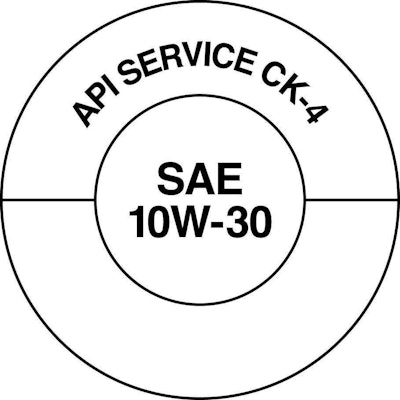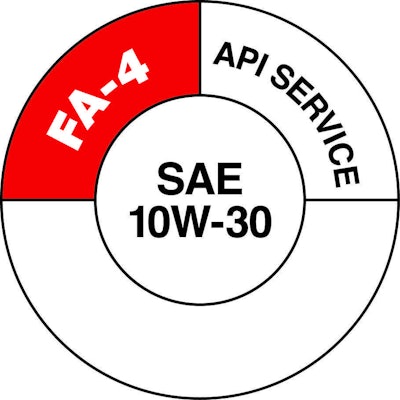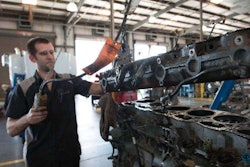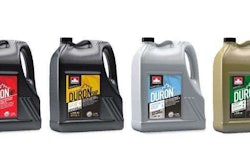 API developed two visually different API Service Symbol Donuts so that consumers can easily distinguish between the two categories. The API CK-4 (above) Donut will look the same as the current CJ-4 Donut.
API developed two visually different API Service Symbol Donuts so that consumers can easily distinguish between the two categories. The API CK-4 (above) Donut will look the same as the current CJ-4 Donut.The American Petroleum Institute’s (API) new diesel engine oil standards – API CK-4 and FA-4 – will hit store shelves and bulk tanks nationwide Thursday. Earlier this year, API’s Lubricants Group approved the new API CK-4 and FA-4 specifications – previously widely referred to as PC-11 – to address the needs of modern engine technologies and to help diesel engine OEMs meet increasingly stringent emissions requirements.
Kevin Ferrick, senior manager of API’s engine oil licensing and certification system, says the time between last winter’s approval of the categories and the first licensing Dec. 1 gave large, medium, and small oil marketers the ability to test their new formulations and get them ready for market.
“This signals the culmination of almost nine years of cross-industry collaboration in the development of the new standards,” he adds.
API CK-4 oils will replace current API CJ-4 engine oils, the formulation most widely available today. It is backward compatible with most applications where engine manufacturers currently recommend CJ-4 and will provide a number of improvements over CJ-4, including improved shear stability, oxidation resistance, and aeration control.
“I really look as CK-4 as am improved CJ-4 oil,” says Stede Granger, Shell’s OEM technical manager. “I think the industry feels the same way. The CJ-4 category has been in place for 10 years. [The CK-4 formulation] is everything CJ-4 was, plus a little bit more. It’s improving an already good product.”
Tony Negri, HDEO product director for Phillips 66 Lubricants, says the new formulations do everything that the familiar CJ-4 oils did, while also improving wear resistance, reducing aeration and decreasing corrosion.
“API added a few new qualification tests and upgraded a few others to increase confidence in the durability of the new oil formulations,” he says.
“The products coming out have been thoroughly bench tested and field tested in the market today,” adds Len Badal, global Delo brand manager for Chevron. “The industry’s done a good job of making sure these products are going to perform well for [consumers].”
 The new API FA-4 Donut features a shaded section to differentiate API FA-4 oils from CK-4 oils.
The new API FA-4 Donut features a shaded section to differentiate API FA-4 oils from CK-4 oils.API FA-4 oils will provide similar improvements over CJ-4 oils, but are only intended for use in newer on-highway diesel engines.
Brian Humphrey, OEM technical liaison for Petro-Canada Lubricants, says he expects the majority of truck OEMs will recommend and/or allow CK-4 oils as the next step up from CJ-4, due to their backwards-compatibility.
Granger says Shell provided truck OEMs with pilot formulations well ahead of their launch date, and currently has more than 45 million miles of fleet testing logged. Badal says OEMs, likewise, have signed off on the new Delo formula and that Chevron has more than 40 million miles tested. That includes half a million hours in off-road vehicles. Badal says Chevron’s test group covered “900 vehicles with diesel engines” and 460 fleet trucks.
Negri says Phillips 66 has fleet tested its new formulations for four years in more than 330 trucks, accumulating 53 million miles.
FA-4 oils will have limited or no backward compatibility with on- and off-highway diesel engines where engine manufacturers recommended CJ-4, but are expected to play an important role in some current and new diesel engines by protecting those engines and at the same time helping them meet more stringent emissions requirements.
To-date, Detroit Diesel is the only OEM to announce they would factory fill 2017 model year and newer engines with FA-4 oils.
“They can use [FA-4] and switch over to a CK-4 if they want,” Badal says, “and it’s not going to cause any problems with their warranty. Or they can stick with the FA-4. It’s their choice.”
“As the FA-4 oils have specifically been designed for 2017 on-highway engines,” Humphrey adds, “we expect to see adoption of this category build from January onwards as OEMs release their recommendations.”
Ferrick notes that CK-4 and FA-4 oils are designed for different applications and advises technicians and consumers to check owner’s manuals or with engine manufacturers to determine which oil is right for their vehicle.
For fleet customers with bulk tanks, Granger suggests using the time just before making the switch to perform a tank inspection.
“Let the oil run low before switch,” he says, “inspect for water penetration and then refill with new product.”
If that isn’t feasible, Granger suggests drawing the tank down as low as possible and refill with CK-4. The resulting mixture will still perform to a higher standard than CJ-4.
“Targeting a 5 percent heel remaining should provide adequate protection from diluting the characteristics of the new CK-4 product,” Negri says.
Badal agreed, but adds if you’re using a common weight oil you probably already have CK-4 oils in your tank.
“If you’re using a CJ-4 10-30 … we have have already put CK-4 capable oils in the marketplace,” he says.
Granger says Shell does not plan on keep its CJ-4 products on the market with the exception of its 0W-40 formulation, which is used in harsh winter conditions.
Badal says Chevron will work to phase out its CJ-4 formulas over the next six months to a year for 15-40 and 15-30 oils.
“That’s for the folks who are a little slower to transition or need some extra time,” he says, adding the older oil formula will be increasingly difficult to find 90-plus days after the Dec. 1 launch date.
Phillips 66, Negri says, will keep a limited number of CJ-4 options in its product line until at least March 1, 2017.











